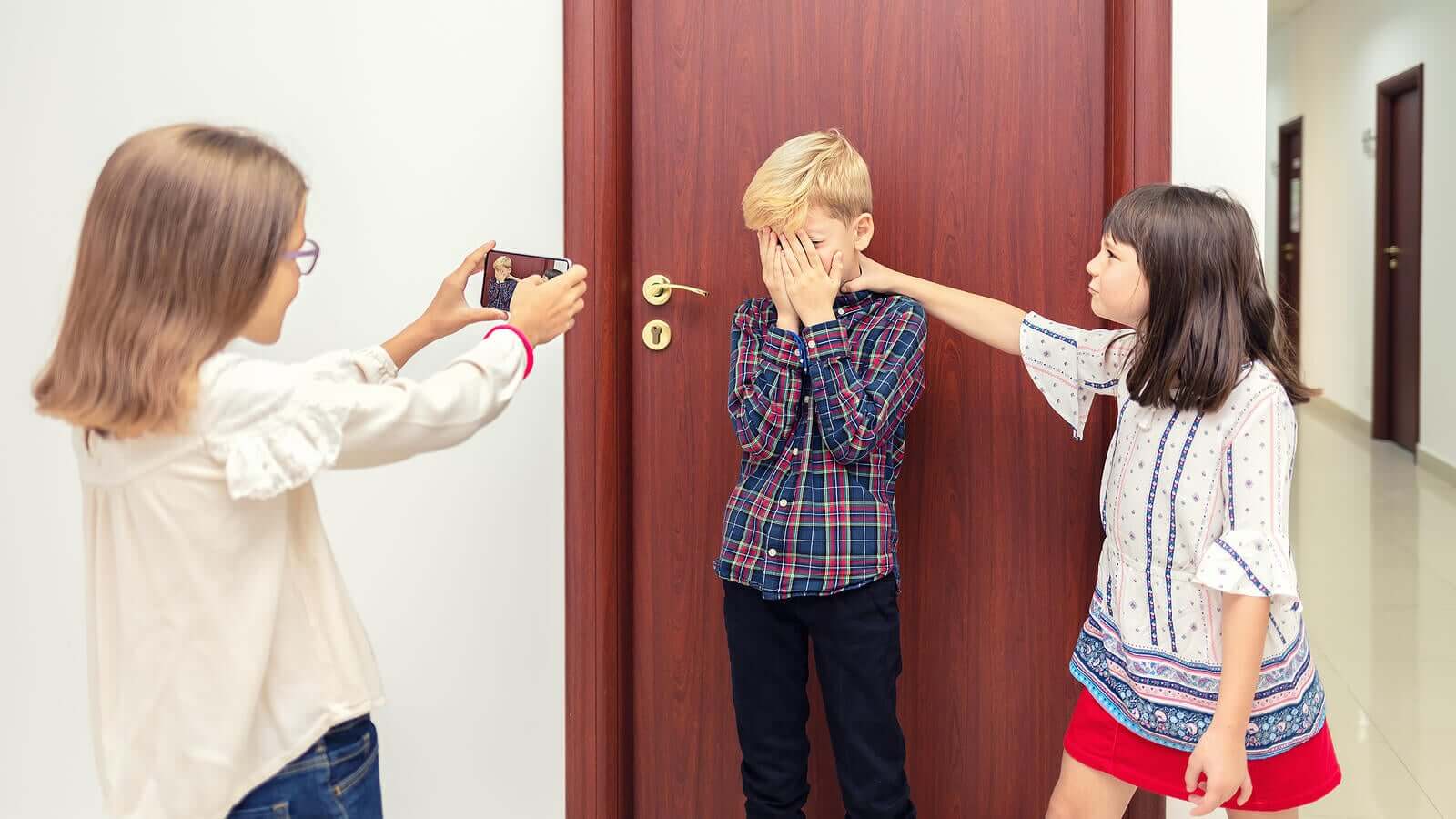8 Tips to Overcome the Consequences of Bullying


Written and verified by the psychologist Mara Amor López
Many children and teenagers unfortunately suffer from bullying in schools, whether physical or psychological. This bullying causes the victims significant emotional suffering that must be addressed. In the following article, we’re going to look at some advice on how to overcome the consequences of bullying.
It’s important that these situations are reported. Once this situation has been resolved, it’s essential that professional help is sought to treat the psychological consequences of the harassment.
Today we want to share some tips on how to go about this. However, keep in mind that the advice below should never replace the help of a professional.
Consequences of bullying: Definition and analysis of the phenomenon
When we speak of bullying, we’re referring to the physical or psychological harassment or mistreatment exercised by one or more aggressors toward a victim. Unfortunately, it’s a situation that’s occurring more and more frequently among children and adolescents. What’s more, it’s traumatic for them.

The victim suffers not only during the bullying, but also afterwards, through the psychological consequences that the bullying usually leaves behind. These can manifest themselves through anxiety, nightmares, insecurity, depression, post-traumatic stress disorder, somatisation, etc.
The important thing to end bullying is, besides treating the victim for the emotional damage suffered, also treating the aggressors so that they don’t do it again. Often, bullies are insecure people who seek to feel superior by humiliating those they consider inferior.
Tips to overcome the consequences of bullying
It would be useful to work with both parties (victim and aggressor). We’ll now focus on the victim and provide some keys to overcoming the consequences of bullying.
Asking for psychological help
The first thing we should do is ask for professional help if the child or adolescent needs it. Sometimes these situations are very traumatic for them and they need the help of a mental health specialist to overcome the fears, anxiety and, in general, the emotional aftermath of this bullying.
It can be very difficult to try to resolve it on your own without help, as you don’t have the necessary tools to do so. We can ask for help from the professional we need in our case, whether it’s medical, psychiatric, psychological, etc.
Be clear that it isn’t the victim’s fault
Children and adolescents who are victims of bullying often feel guilty, but this is unhealthy and unrealistic. The blame for suffering from bullying never lies with the victim, even if they think so.
For this reason, we must help our children to become aware that the blame always lies with the person who assaults them and that these thoughts of guilt only harm them.
Accepting the experience
In order to overcome the consequences of bullying, it’s important to accept the situation and what’s happened. This doesn’t mean that we should forget what’s happened, but it does mean that we must accept that it has happened and that the situation’s in the past and doesn’t have to happen again.
A mental health professional can help with this process by providing the right strategies for managing emotions and for the pain to evolve.
Moving away from the negative thoughts left by the aftermath of bullying
After this situation of bullying, the victims may present negative thoughts (of insecurity, self-destruction, fears, etc.) in a recurrent way. If these thoughts disable and produce significant distress in children and adolescents, it’s important to work with a professional, as they’ll be the ones who can provide resources to block these kinds of ideas.
Expressing what you feel
It’s very important that all the emotions they feel, whether positive or negative, are expressed. This is a way of understanding what a child’s experienced and how it’s affected them. If they analyze their feelings and emotions, they’ll be more and more equipped to move forward and feel better.
Moving away from bitterness
It’s common that, when someone causes us harm, we experience feelings of revenge and anger against that person. But these feelings only intensify the suffering experienced. Therefore, it’s important to move away from the anger and accept the situation. This will allow the child or adolescent to advance in their recovery process.
Empowerment
It must be made clear to the victims that they’re important, special and valid people and that they deserve all the good that life has to offer. What’s more, that even though they’ve lived through such a traumatic situation, they have to trust in themselves and that, with effort and self-confidence, they can achieve anything they set out to do.

Transforming the pain
Pain is an emotion that produces suffering and has its positive side, as it has the capacity to make us fight and strive to change the things that are producing that damage.
For example, we can transform this pain into art (painting, poetry, sculpture, etc.). The important thing is to focus on something that makes you feel good, not on the pain.
On the aftermath of bullying
The advice on how to overcome the consequences of bullying that we’ve given you can be of great help in facing the traumatic situation that a child or adolescent has gone through, although it can never replace the guidance that a professional can provide.
It’s important to observe our child and to be attentive to the signs that his or her behavior may give us and, thus, to decide which path to choose. Above all, it’s fundamental that we give them our support, love, affection and company; this will help them in their recovery.
Many children and teenagers unfortunately suffer from bullying in schools, whether physical or psychological. This bullying causes the victims significant emotional suffering that must be addressed. In the following article, we’re going to look at some advice on how to overcome the consequences of bullying.
It’s important that these situations are reported. Once this situation has been resolved, it’s essential that professional help is sought to treat the psychological consequences of the harassment.
Today we want to share some tips on how to go about this. However, keep in mind that the advice below should never replace the help of a professional.
Consequences of bullying: Definition and analysis of the phenomenon
When we speak of bullying, we’re referring to the physical or psychological harassment or mistreatment exercised by one or more aggressors toward a victim. Unfortunately, it’s a situation that’s occurring more and more frequently among children and adolescents. What’s more, it’s traumatic for them.

The victim suffers not only during the bullying, but also afterwards, through the psychological consequences that the bullying usually leaves behind. These can manifest themselves through anxiety, nightmares, insecurity, depression, post-traumatic stress disorder, somatisation, etc.
The important thing to end bullying is, besides treating the victim for the emotional damage suffered, also treating the aggressors so that they don’t do it again. Often, bullies are insecure people who seek to feel superior by humiliating those they consider inferior.
Tips to overcome the consequences of bullying
It would be useful to work with both parties (victim and aggressor). We’ll now focus on the victim and provide some keys to overcoming the consequences of bullying.
Asking for psychological help
The first thing we should do is ask for professional help if the child or adolescent needs it. Sometimes these situations are very traumatic for them and they need the help of a mental health specialist to overcome the fears, anxiety and, in general, the emotional aftermath of this bullying.
It can be very difficult to try to resolve it on your own without help, as you don’t have the necessary tools to do so. We can ask for help from the professional we need in our case, whether it’s medical, psychiatric, psychological, etc.
Be clear that it isn’t the victim’s fault
Children and adolescents who are victims of bullying often feel guilty, but this is unhealthy and unrealistic. The blame for suffering from bullying never lies with the victim, even if they think so.
For this reason, we must help our children to become aware that the blame always lies with the person who assaults them and that these thoughts of guilt only harm them.
Accepting the experience
In order to overcome the consequences of bullying, it’s important to accept the situation and what’s happened. This doesn’t mean that we should forget what’s happened, but it does mean that we must accept that it has happened and that the situation’s in the past and doesn’t have to happen again.
A mental health professional can help with this process by providing the right strategies for managing emotions and for the pain to evolve.
Moving away from the negative thoughts left by the aftermath of bullying
After this situation of bullying, the victims may present negative thoughts (of insecurity, self-destruction, fears, etc.) in a recurrent way. If these thoughts disable and produce significant distress in children and adolescents, it’s important to work with a professional, as they’ll be the ones who can provide resources to block these kinds of ideas.
Expressing what you feel
It’s very important that all the emotions they feel, whether positive or negative, are expressed. This is a way of understanding what a child’s experienced and how it’s affected them. If they analyze their feelings and emotions, they’ll be more and more equipped to move forward and feel better.
Moving away from bitterness
It’s common that, when someone causes us harm, we experience feelings of revenge and anger against that person. But these feelings only intensify the suffering experienced. Therefore, it’s important to move away from the anger and accept the situation. This will allow the child or adolescent to advance in their recovery process.
Empowerment
It must be made clear to the victims that they’re important, special and valid people and that they deserve all the good that life has to offer. What’s more, that even though they’ve lived through such a traumatic situation, they have to trust in themselves and that, with effort and self-confidence, they can achieve anything they set out to do.

Transforming the pain
Pain is an emotion that produces suffering and has its positive side, as it has the capacity to make us fight and strive to change the things that are producing that damage.
For example, we can transform this pain into art (painting, poetry, sculpture, etc.). The important thing is to focus on something that makes you feel good, not on the pain.
On the aftermath of bullying
The advice on how to overcome the consequences of bullying that we’ve given you can be of great help in facing the traumatic situation that a child or adolescent has gone through, although it can never replace the guidance that a professional can provide.
It’s important to observe our child and to be attentive to the signs that his or her behavior may give us and, thus, to decide which path to choose. Above all, it’s fundamental that we give them our support, love, affection and company; this will help them in their recovery.
All cited sources were thoroughly reviewed by our team to ensure their quality, reliability, currency, and validity. The bibliography of this article was considered reliable and of academic or scientific accuracy.
- Irurtia, M.J., Avilés, J.M., Arias, V. y Arias, B. (2009). El tratamiento de las víctimas en la resolución de los casos de bullying. AMAzônica, 2(1): pp. 76 – 99.
- Saiz, E. T. (2019). Las víctimas del “bullying”: el antes y el después del impacto agresivo. Indivisa: Boletín de estudios e investigación, (19), 113-133.
- Díaz, A. D. C. R., & Moreu, Y. K. M. (2012). Bullying: un fenómeno por transformar. Duazary: Revista internacional de Ciencias de la Salud, 9(1), 98-104.
This text is provided for informational purposes only and does not replace consultation with a professional. If in doubt, consult your specialist.








